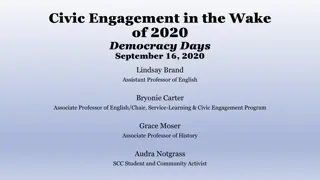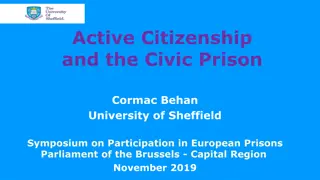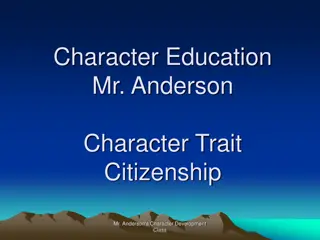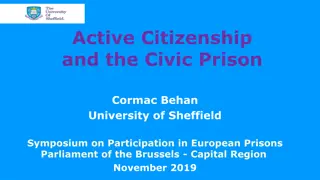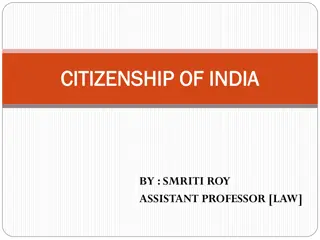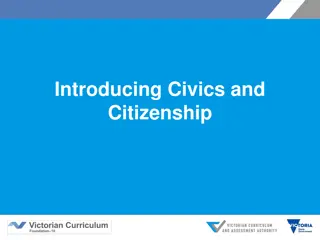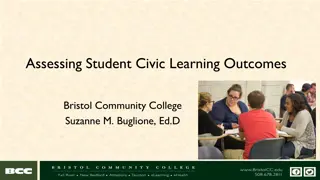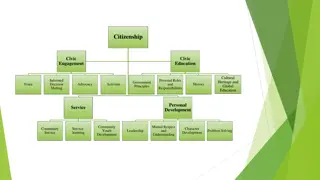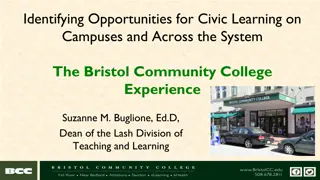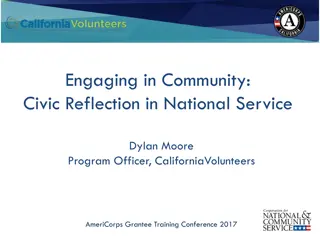Understanding Active Citizenship & Civic Engagement: Definitions and Importance
Encouraging citizens and organizations to actively participate in civil society and decision-making processes is vital for a democratic society. Active citizenship involves participation in public affairs, civil society, and political life with a focus on human rights, democracy, and community well-being. Civic engagement encompasses actions to improve communities through political and non-political processes. This article explores the meanings and significance of active citizenship and civic engagement in fostering democratic institutions and community development.
Download Presentation

Please find below an Image/Link to download the presentation.
The content on the website is provided AS IS for your information and personal use only. It may not be sold, licensed, or shared on other websites without obtaining consent from the author. Download presentation by click this link. If you encounter any issues during the download, it is possible that the publisher has removed the file from their server.
E N D
Presentation Transcript
Module 4 Understanding Active Citizenship & Civic Engagement Unit 2: Active Citizenship and Civic Engagement The EMERGE project benefits from a grant under the Active Citizens Fund Cyprus program, funded by Iceland, Liechtenstein and Norway, through the EEA and Norway Grants 2014-2021.
Introduction It is crucial for to encourage every citizen, as well as non-government organisations, to actively participate in civil society, and be part of the political and decision-making processes. People and NGOs must continue to ensure the rights for all to participate. What does the term active citizenship mean to you? There are no wrong answers and what you say and discuss will reflect where you are coming from in relation to this subject. Civic engagement is necessary in a democratic society for the effective functioning of one s community and state, as it fosters the democratic institutions. Let s look at the two word separately: Active and Citizenship What do they mean to you? Active citizenship is a term that has been used in recent years and has several meanings.
Definitions - Civic Engagement Civic engagement means working to make a difference in the civic life of our communities and developing the combination of knowledge, skills, values and motivation to make that difference. It means promoting the quality of life in a community, through both political and non-political processes Source: Ehrlich, T. (Ed.). (2000). Civic responsibility and higher education. Greenwood Publishing Group. Civic engagement refers to the ways in which citizens participate in the life of a community in order to improve conditions for others or to help shape the community s future Source: Adler, R. P., & Goggin, J. (2005). What do we mean by civic engagement ?. Journal of transformative education, 3(3), 236-253. UNICEF defines civic engagement as: individual or collective actions in which people participate to improve the well- being of communities or society in general . Source: Cho, A., Byrne, J. Pelter, Z. (2020) Digital civic engagement by young people. UNICEF Offices of Global insight and Policy. Accessed on January 5, 2021
Definitions - Active Citizenship One simple idea of active citizenship then is that of participation in public affairs: If we are to have a healthy democracy we need to support each other in identifying the issues that concern us, and develop the confidence and skills to make a difference to the world around us. (Woodward 2004) Hoskins and Mascherini (2009) defined active citizenship as; Participation in civil society, community and/or political life, characterised by mutual respect and non-violence and in accordance with human rights and democracy. (Hoskins, 2009) Active citizens are those who look beyond the basic legal duties and are further engaged voluntarily in activities that somehow affect the public life of their locality or communities.
Forms of Active Citizenship and Civic engagement What are the different forms of Active Citizenship and Civic Engagement? Besides voting, how can citizens actively participate and engage? Brainstorm in small groups and assign one representative. Present your findings.
Forms of Active Citizenship and Civic engagement Civic engagement entails the active involvement of individuals, either independently, in groups, or through non-governmental organizations (NGOs), in addressing local, national, and global issues. It encompasses a wide range of actions taken by people to advance their beliefs and interests, express their views, and participate in social and political matters. It is crucial to recognize that civic engagement extends beyond traditional political processes such as voting. There are numerous avenues through which individuals can actively contribute to society and make a difference. This includes volunteering, community organizing, advocating for social causes, participating in public discussions and debates, engaging in peaceful protests, and supporting nonprofit organizations. By actively engaging in civic life, individuals have the opportunity to shape their communities, express their values, and contribute to the betterment of society. Civic engagement is a vital aspect of democratic participation and helps foster an informed and active citizenry.
What Constitutes an Active Citizenship? Involvement: A good decision requires the knowledge, experience, and opinions of everybody. There must be a sense of engagement among citizens in the world around them. Active citizenship consists of three separate but mutually dependent qualities: Active citizenship involvement, participation and influence. Participation: Citizens should not simply be able to participate. In order to do so, they should feel a sense of duty and responsibility. Influence: It is critical for citizens to see that their participation leads to results. It is important for participants to feel that their input is important and that the decisions are made with their input in mind.
Key Characteristics of Active Citizenship 1. Civic Involvement: Individuals who are proactive in their community engage in actions like voting in polls, participating in political debates, and becoming part of local groups. They stay updated on public affairs and show concern for topics that influence their community and nation. 2. Community Service: Such proactive citizens frequently dedicate their abilities and time to help various initiatives and causes, including philanthropic bodies, community improvement projects, and preservation of the environment. 3. Championing Causes and Taking a Stand: Proactive citizenship may entail advocating for equality, human rights, and social justice. Champions and activists strive to increase awareness of significant issues, oppose unfair policies, and advocate for progressive alterations. 4. Community-Led Endeavours: Proactive individuals may start community-based movements and projects to tackle local problems and generate positive effects in their immediate environment. 5. Engaged Democracy: The idea of proactive citizenship is deeply linked with the notion of engaged democracy, where individuals actively partake in decision-making processes, community design, and policy formation. 6. Community Accountability: Proactive citizens are accountable for their actions and the welfare of their community, with the objective of bringing about positive societal change.
Hoskins and Mascherini Active Citizenship Operational Model Hoskins and Mascherini, developed an operational model of active citizenship which is based on four dimensions as follows: 1. Protest and social change 2. Community life 3. Representative democracy 4. Democratic values.
Hoskins and Mascherini Active Citizenship Operational Model Protest and Social change protest activities (e.g.. signing a petition, taking part in a lawful demonstration, boycotting products, and contacting a politician) participation in Human rights organisations (membership, participation activities, donating money and voluntary work) participation in Trade unions (membership, participation activities, donating money and voluntary work) participation in Environmental organisations (membership, participation activities, donating money and voluntary work)
Hoskins and Mascherini Active Citizenship Operational Model Community life Religious organisations (membership, participation activities, donating money and voluntary work) Business organisations (membership, participation activities, donating money and voluntary work) Cultural organisations (membership, participation activities, donating money and voluntary work) Social organisations (membership, participation activities, donating money and voluntary work) sport organisations (membership, participation activities, donating money and voluntary work) parent-teacher organisations (membership, participation activities, donating money and voluntary work) unorganized help
Hoskins and Mascherini Active Citizenship Operational Model Representative democracy engagement in political parties (membership, participation, donating money or voluntary work for political parties) voting turnout (e.g. participation in European and national elections) participation of women in political life ( e.g. percentage of women in national parliaments) Democratic values democracy (Democratic Values) intercultural (immigration) understanding and human rights (human rights in relationship to law and rights of migrants) Their study of 19 European countries showed that the Nordic countries, and especially Sweden, have the highest rate of active citizenship, followed by Central Europe and Anglo- Saxon countries. Mediterranean countries and Eastern European countries have the least involvement in active citizenship.
Examples of Active Citizenship There are numerous ways individuals can engage in civic activities and contribute to society. Some examples include: Taking part in protests, rallies, or grassroots initiatives to raise awareness about social issues, advocate for change, and promote civic engagement. Joining a civil society organization (such as an NGO or charity) to support its work and contribute to its mission. Writing letters or emails to elected officials and government authorities to express concerns, opinions, and suggestions on various social and political matters. Becoming a member of a political party and actively participating in its activities, such as campaigning, attending meetings, and advocating for policy changes. Enrolling in a trade union or professional body to collaborate with others in protecting workers' rights and advancing professional interests. Engaging in blogging, writing articles, and actively using social media platforms to express personal views, share information, and engage in discussions about social and political affairs. These forms of civic engagement allow individuals to actively contribute to their communities, express their perspectives, and influence the decision-making processes that shape society. Participating in consultative bodies or advisory committees that provide input and recommendations on policy matters to decision-makers.
Active Citizens Vote Listen to others ideas and offer their own ideas Participate in things like public meetings, social groups, committees, councils Help their society by doing good to help others Help their neighbours Speak out against hatred, injustice, inequality Keep their environment clean, pick up garbage, don t litter Try to make their communities a better place for everyone Protest Pay attention to social issues Debate Care about what is happening in the world and try to help victims of injustice, conflict and war
Benefits of Active Citizenship Return to Padlet wall (same link as previously) and answer the following question: How could becoming an active citizen benefit your community and your personality? Briefly, state four (4) benefits of active citizenship and civic engagement.
Benefits of Active Citizenship People can participate in their community. People are empowered to take part in the decisions which affect their lives Active citizenship supports democratic procedures. People know and understand that they are participating for political, social, or economic reasons so that they can make informed decisions. People are supported to develop their skills and knowledge (life- long learning). People get involved to challenge or change existing structures. People get involved to meet others and form networks.
Worksheet: Group Activity Activity: Constraints and Motivations for Active citizenship and engagement Students will work in groups Each group will find a case of a situation when people don t participate actively in their community or society. Discuss why people do not get involved in that particular case. Possible strategies that can be used to engage people to get involved in that situation. Brainstorm and make a list of reasons that prevent people from being socially engaged (worksheet) Brainstorm and make a list of how to engage people in social and civic issues (worksheet)
Motivations to be an Active Citizen Participation in the Community and Connecting People: Active citizenship encourages participation in local community activities. This could be anything from local clean-up drives to organizing community events. This fosters a sense of community spirit and helps individuals build connections with each other, enhancing social cohesion. Empowering People to Influence the Decisions Which Affect Their Lives: Active citizens have the opportunity to influence the policies and decisions that impact their daily lives. This could be through voting, participating in public consultations, or engaging with local representatives. This not only leads to policies that better reflect the needs and interests of the community, but also gives individuals a sense of agency. Knowledge and Understanding of the Political, Social, and Economic Context of Their Participation: Active citizenship often involves gaining a deeper understanding of the political, social, and economic context of one's actions. This knowledge helps individuals make more informed decisions about their actions and how they can contribute to their community.
Motivations to be an Active Citizen Ability to Challenge Existing Structures While Supporting Democratic Procedures: Active citizens are well-positioned to question and challenge existing power structures in a democratic way. They can use their voice and their vote to push for changes that they believe are necessary, helping to keep authorities accountable and ensuring that democratic processes are upheld. Supporting People to Develop Their Skills and Knowledge to Build Fairer and More Resilient Societies: Active citizenship can contribute to personal development by encouraging individuals to learn new skills, such as leadership, communication, or problem-solving skills. These abilities are not only valuable for personal growth but also contribute to the development of a more resilient society, as individuals are better equipped to face challenges and contribute positively to their communities.
The EMERGE project benefits from a grant under the Active Citizens Fund Cyprus program, funded by Iceland, Liechtenstein and Norway, through the EEA and Norway Grants 2014-2021.









